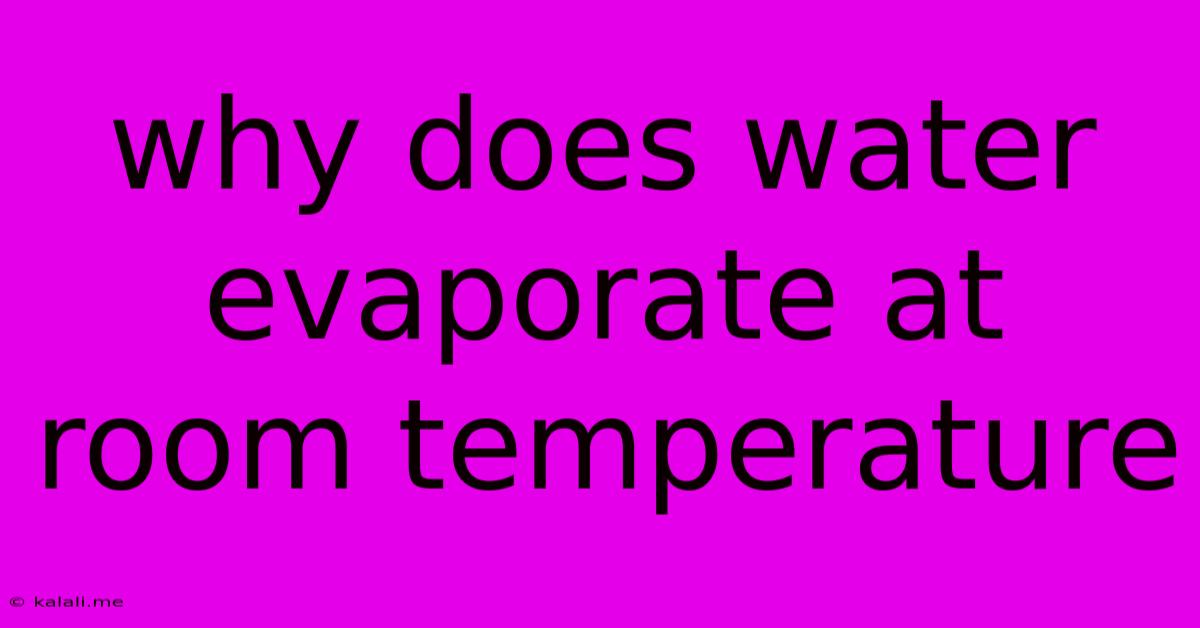Why Does Water Evaporate At Room Temperature
Kalali
Jun 02, 2025 · 3 min read

Table of Contents
Why Does Water Evaporate at Room Temperature? The Science of Evaporation
Meta Description: Ever wondered why puddles disappear or your clothes dry even without direct heat? This article explains the fascinating science behind water evaporation at room temperature, exploring the role of vapor pressure, kinetic energy, and humidity.
Water evaporating at room temperature might seem like a simple observation, but it's a fascinating example of the constant movement of molecules and the interplay between liquid and gas phases. Understanding this process requires delving into the world of molecular kinetics and atmospheric conditions. This article will break down the key factors that allow water to evaporate even without a boiling point.
Understanding Molecular Movement: The Key to Evaporation
At the heart of evaporation lies the concept of kinetic energy. Water molecules are in constant motion, vibrating and colliding with each other. While the average kinetic energy determines the temperature, individual molecules possess varying levels of energy. Some molecules possess enough kinetic energy to overcome the attractive forces (intermolecular forces) holding them together in the liquid phase. These high-energy molecules escape the liquid's surface and transition into the gaseous phase – water vapor.
This process is continuous. While some molecules gain enough energy to escape, others lose energy and return to the liquid phase. The net effect, however, determines the rate of evaporation. At room temperature, this process happens constantly, though slowly.
Vapor Pressure: The Driving Force
Another crucial factor is vapor pressure. This is the pressure exerted by the water vapor molecules in the air above the liquid water. When the vapor pressure of water is lower than the surrounding atmospheric pressure, more water molecules will evaporate to try and reach equilibrium. This equilibrium point is when the rate of evaporation equals the rate of condensation.
The higher the temperature, the higher the vapor pressure, and thus, the faster the evaporation rate. Even at room temperature, the vapor pressure of water is non-zero, meaning some water molecules will always escape into the atmosphere.
Humidity: The Atmospheric Influence
Humidity, or the amount of water vapor already present in the air, significantly impacts evaporation. High humidity means the air is already saturated with water vapor, reducing the driving force for further evaporation. Conversely, low humidity allows for faster evaporation as there's more "room" for water molecules in the gaseous phase. This is why clothes dry faster on a dry day than on a humid day.
Surface Area: More Space, Faster Evaporation
The surface area of the water also plays a crucial role. A larger surface area exposes more water molecules to the atmosphere, increasing the number of molecules that can escape and thus, accelerating evaporation. This is why spreading out laundry allows it to dry more quickly.
Factors Affecting Evaporation Rate: A Summary
To summarize, several key factors contribute to water evaporation at room temperature:
- Kinetic Energy of Water Molecules: The continuous movement of water molecules, with some possessing sufficient energy to escape into the gaseous phase.
- Vapor Pressure: The pressure exerted by water vapor in the air; a lower vapor pressure encourages evaporation.
- Humidity: High humidity slows evaporation, while low humidity speeds it up.
- Surface Area: A larger surface area leads to faster evaporation.
- Air Movement (Wind): Wind removes saturated air above the water's surface, maintaining a lower vapor pressure and promoting further evaporation. This is why clothes dry quicker on a windy day.
- Temperature: Although we're focusing on room temperature, even slight variations in temperature affect kinetic energy and vapor pressure, influencing evaporation rates.
Understanding these factors provides a complete picture of why water evaporates even at room temperature, a process that's crucial for various natural phenomena and everyday occurrences. It's a testament to the dynamic nature of molecules and their constant interaction with their environment.
Latest Posts
Latest Posts
-
Does Phd Stands For Permanent Head Damage
Jun 04, 2025
-
Get The Origin Branch Of A Tag
Jun 04, 2025
-
Line 2 24 No Viable Alternative At Input
Jun 04, 2025
-
How Long Do Cooked Lentils Last In The Fridge
Jun 04, 2025
-
Can You Start A Sentence With As Such
Jun 04, 2025
Related Post
Thank you for visiting our website which covers about Why Does Water Evaporate At Room Temperature . We hope the information provided has been useful to you. Feel free to contact us if you have any questions or need further assistance. See you next time and don't miss to bookmark.